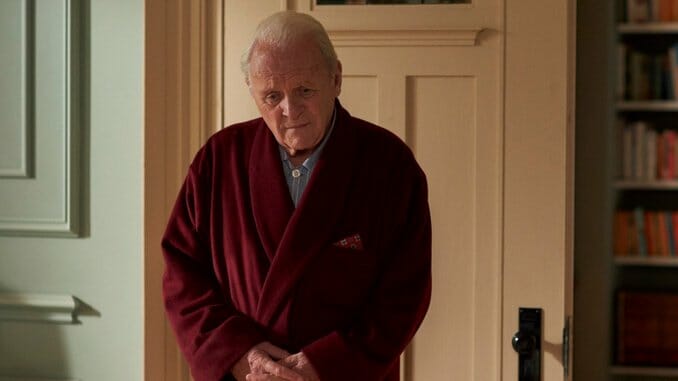Anthony Hopkins’ Monumental Performance Dominates The Father

The best line reading Anthony Hopkins gives during his monumental performance in Florian Zeller’s The Father comes in the film’s final scene, which is both a blessing and a king bummer. All anyone should want to do is live in that reading, sit awestruck at how Hopkins puts a name to the one thing that can assuage his character’s anguish and stare grief-stricken in the knowledge that the one thing he needs is the one thing he can’t have. The entire movie is an exercise in heartache, but it’s this final piece of dialogue that punctuates the drama preceding it and finally releases the suffering roiling under its surface.
Hopkins’ character, also named Anthony, spends most of The Father fighting for his independence like a wolf cornered by hunters, stubbornly refusing to accept his clear mental deterioration and the need for professional help. His daughter Anne (Olivia Colman) has, as the picture opens, tried and failed several times over to find him a caregiver he’ll take to—and given her announced intention to relocate to Paris, her search has gained in urgency. Anthony isn’t pleased at her news. In fact, as they sit in his well-appointed London flat together, he gives her the business, expressing his opinion of her life plans with his canines bared. He’s not happy. But deep down, in the parts of him that remain self-aware, he’s mostly just afraid.
Zeller has adapted The Father from his own award-winning play Le Père, and though he’s left the material of the script untouched, he’s transitioned to his new medium with subtle enhancements: Cinematographer Ben Smithard uses his lens as a screw gun, putting up figurative walls around Zeller’s cast in addition to the literal walls of the set. Visual claustrophobia compliments spatial claustrophobia, trapping the viewer in the flat and, far more importantly, in Anthony’s crumbling psyche. A simple open-concept apartment becomes labyrinthine through his point of view, and that’s before supporting characters begin to wander about its halls and loiter in its doors, in and out of his perception, assuming they were even there to begin with. Anne’s husband rotates between Bill (Mark Gatiss) and Paul (Rufus Sewell), each repeating the other’s attempts at strong-arming Anthony into leaving his flat, as if there’s a question as to who Anne is married to, or maybe when.
-

-

-

-

-

-

-

-

-

-

-

-

-

-

-

-

-

-

-

-

-

-

-

-

-

-

-

-

-

-

-

-

-

-

-

-

-

-

-

-








































